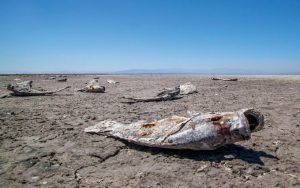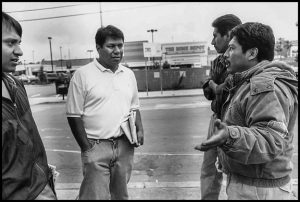by David Bacon, copyright 2018
The American Prospect, February 13, 2018

In San Francisco janitors and other workers support AB 450, a bill to protect workers during immigration raids and enforcement actions.
Labor historian Fred Glass, looking at the impact of immigration on California’s labor movement, notes that many immigrants have arrived in the state with a long history of labor and left-wing activism. Unions have then called on that history and consciousness to aid in organizing drives among janitors, farm workers, hotel housekeepers, and others. “Because the labor movement has understood this fact and designed its efforts around it,” he argues, “California’s unionization rate remains at 16 percent while the national average is 11 percent.” The state has 2.55 million union members, far more than any other.
To union leaders, that’s also one explanation-in addition to the state designating itself as a sanctuary-for the announcement by the Trump administration that it is targeting California for intensive workplace immigration enforcement. “It’s obvious retaliation for California standing up for immigrants,” charges Wei-Ling Huber, president of UNITE HERE Local 2850, the hotel union in the East and North San Francisco Bay Area. “Its purpose is to create a climate of fear among immigrant workers in general, and to attack the unions that have defended them.”
Last fall the state legislature passed a series of bills intended to protect immigrants, especially immigrant workers. One bars police from asking about immigration status and from participating in immigration enforcement actions with federal agents. A second requires warrants before employers can give agents access to workplaces and records of workers’ immigration status.


